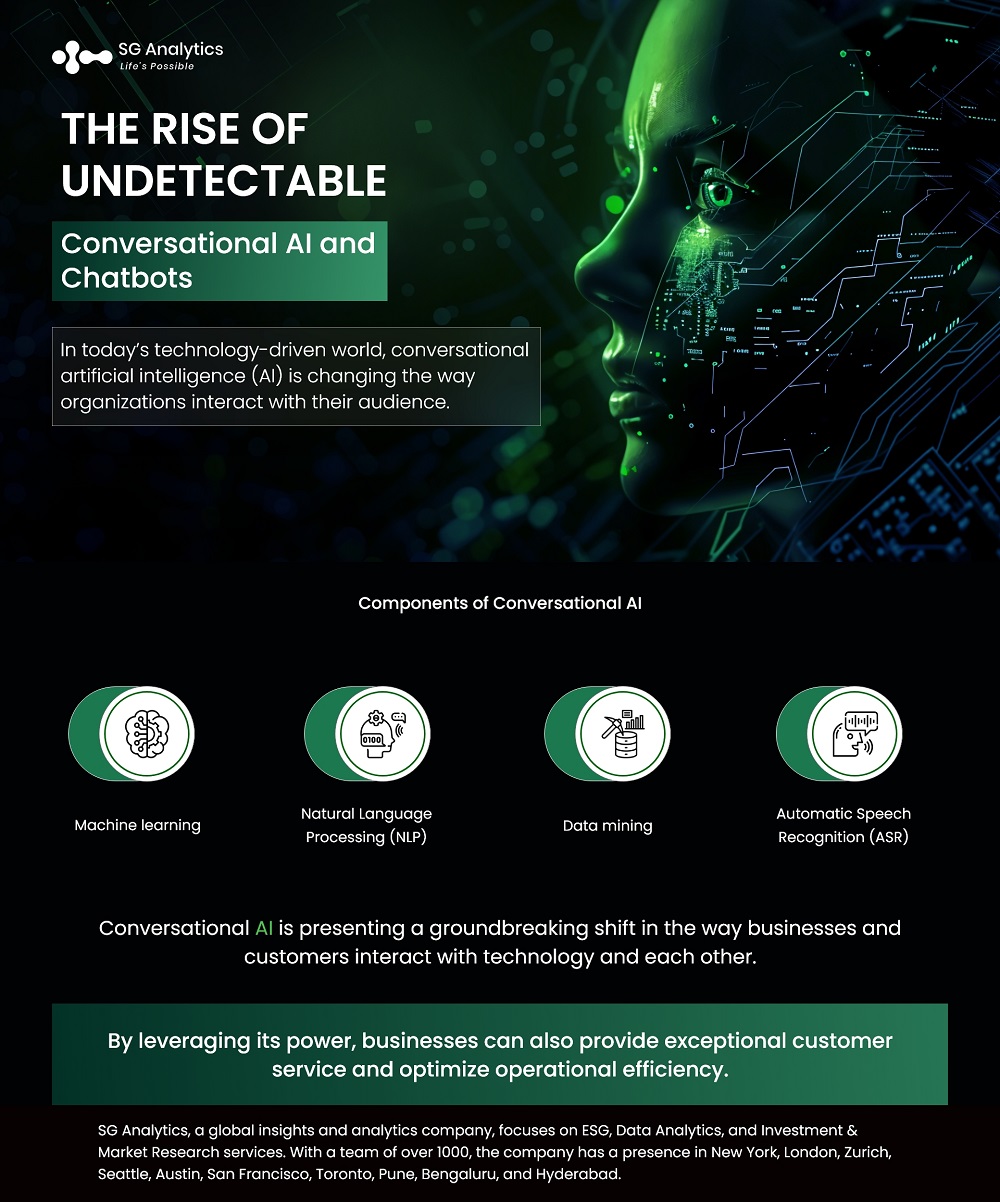In today’s highly competitive landscape, delivering exceptional consumer experiences is critical for businesses to thrive and scale. Customers are technically savvy and are demanding instant access to support across physical and digital channels. This is where conversational AI proves to be a true ally in driving results and optimizing costs. Conversational AI has a positive influence on all facets of businesses. From mimicking human interactions to making the customer journey hassle-free, conversational AI can do it all.
Whether through next-gen chatbots, intelligent virtual assistants, or voice-enabled devices, businesses can now create dynamic AI agents to interact with humans in a way that is close to how human representatives interact with their customers. This fact has proven to be a powerful tool for customer support, sales & marketing, and employee experience across industries.
Read more: From Digital Transformation to AI Revolution: Navigating the Curve
The Power of Conversational AI
In today’s technology-driven world, conversational artificial intelligence (AI) is changing the way organizations interact with their audience. With natural language processing (NLP) and machine learning (ML) techniques, conversational AI can simulate human conversation, enabling enterprises to offer seamless and efficient customer experiences.
Conversational AI refers to the cutting-edge field that includes creating computer systems that can engage in human-like and interactive conversations. It enables systems to understand and respond to user inputs. Conversational AI can harmoniously blend innovations with natural language processing, machine learning, and dialogue management to achieve highly intelligent bots for text and voice channels.
Conversational AI is transforming customer interactions. A recent Gartner study highlighted that the deployment of conversational AI within contact centers will reduce agent labor costs by an impressive $80 billion by the year 2026. By automating customer interactions through voice and digital channels, conversational AI’s utilization will increase from the current 1.6% to one in 10 interactions by 2026.

Components of Conversational AI
Conversational AI brings together advanced technologies, including AI, NLP, and machine learning, to design chatbots that can understand what humans are saying and responding in a way that humans would. There are four key components that are critical to the whole process:
-
Machine learning
A branch of AI, machine learning (ML), uses a range of complex algorithms and statistical models to identify existing patterns from massive data sets and make predictions. ML is critical to the success of the conversation AI, as it enables the framework to learn from the data and enhance its responses to human language.
-
Natural Language Processing (NLP)
Natural Language Processing (NLP) is the second component that concerns transforming unstructured data into a machine-readable format and processing it to create an appropriate response. NLP is essential to converse with AI engines, allowing the system to understand user input and produce relevant responses. It comprises five main processes: input generation, input analysis, syntactic and semantic analysis, and output transformation.
-
Data mining
The third component used in conversation AI engines is data mining. It enables businesses to discover patterns and insights from conversational data to enhance the system’s functionality. It is a method for identifying unknown properties, unlike machine learning, which focuses on generating predictions based on recent data. With data mining, businesses can understand their customers and target their marketing efforts more effectively.
-
Automatic Speech Recognition (ASR)
ASR is the final component of conversation AI used for voice-based conversations. It enables conversation AI engines to understand human voice inputs, filter out background noise, utilize speech-to-text to deduce the query, and simulate a human-like response. The engine helps understand and respond to human language, learns from its experiences, and offers better outcomes in subsequent interactions. With the combination of these components, enterprises can create powerful conversational AI solutions to enhance customer experiences, reduce costs, and drive business growth.
Read more: Beyond the Foundational: Generative AI Investors Turn to Applications in 2024
The Growing Influence of Chatbots
Chatbots are becoming an indispensable tool for customer interactions. Today, almost 90% of people have already engaged in at least one chatbot conversation. With approximately 1.5 billion users, chatbots are encountering widespread adoption. Quality chatbots help businesses achieve an impressive response rate of up to 90%, leading to enhanced customer engagement and satisfaction. Furthermore, 62% of consumers prefer interacting with chatbots. More and more small businesses are also recognizing the value of chatbots, with 22% of micro-businesses integrating them into their business operations.
And, due to the rising popularity of chatbots, businesses are turning to trusted mobile app development firms to develop AI-based chatbot apps or consulting them on how to use chatbots to enhance customer experience.

Benefits of Conversational AI Chatbots
Conversational AI presents several advantages, such as cost reduction, faster handling times, improved productivity, and enhanced customer service. Some of the benefits of conversational AI that help businesses to stay competitive include:
- Automating customer service tasks
- Global savings from chatbot usage
- Gathering valuable insights into consumer behavior
- Reducing customer service costs and response times
- Creating new opportunities for innovation and growth
- Multilingual and omnichannel support
Why Does Your Business Need Conversational AI?
Conversational AI is becoming a must-have tool for businesses of all sizes, equipping them to offer a better experience to customers and employees, streamline operations, and gain a competitive edge. It enables businesses to deliver exceptional brand experiences through various channels like websites, messaging apps, and much more. Conversational AI solutions also enable self-service customer support capabilities, allowing users to get resolution at their own pace from anywhere.
Customers today expect instant gratification and personalized attention from businesses, which conversational AI can deliver. With conversational AI, they can provide 24/7 support tailored to individual customer requirements, eliminating the long wait time.
Implementing conversational AI facilitates making data-driven decisions, improving products, and targeting marketing efforts effectively.
No matter the business size, conversational AI enables businesses in driving ROI, boosting customer satisfaction, and building customer loyalty through data-backed solutions and hyper-personalized communications. It also simplifies operations, elevates customer support processes, improves results from marketing efforts, and contributes to overall business growth.
Read more: How Artificial Intelligence Is Changing the Future of Work

Final Thoughts
Conversational AI is presenting a groundbreaking shift in the way businesses as well as customers interact with technology and each other. Its impact is increasingly evident through the voices of virtual assistants like Siri and Alexa or the prevalence of chatbots in customer service.
Conversational AI and chatbots are reshaping the customer service landscape. With their ability to simulate human conversation, these technologies are changing the way enterprises engage with their customers. Backed by natural language processing (NLP), machine learning, and deep learning, conversational AI is bridging the gap between traditional chatbots and advanced AI systems. When implemented effectively, it further enables businesses to streamline complex interactions, making them faster and more user-friendly. Future developments in reinforcement learning are likely to enable AI agents to learn and engage autonomously, thereby shaping a more interactive conversational landscape.
By leveraging the power of conversational AI, organizations can also provide exceptional customer service and optimize operational efficiency. As organizations navigate this evolving market landscape, embracing conversational AI and chatbots is becoming crucial to stay ahead, meet customer expectations, as well as drive business growth.
A leading enterprise in Generative AI solutions, SG Analytics focuses on unlocking unparalleled efficiency, customer satisfaction, and innovation for the client with end-to-end AI solutions. Contact us today to harness the immense power of artificial intelligence and set new benchmarks in operational efficiency, customer satisfaction, and revenue generation.
About SG Analytics
SG Analytics (SGA) is an industry-leading global data solutions firm providing data-centric research and contextual analytics services to its clients, including Fortune 500 companies, across BFSI, Technology, Media & Entertainment, and Healthcare sectors. Established in 2007, SG Analytics is a Great Place to Work® (GPTW) certified company with a team of over 1200 employees and a presence across the U.S.A., the UK, Switzerland, Poland, and India.
Apart from being recognized by reputed firms such as Gartner, Everest Group, and ISG, SGA has been featured in the elite Deloitte Technology Fast 50 India 2023 and APAC 2024 High Growth Companies by the Financial Times & Statista.

